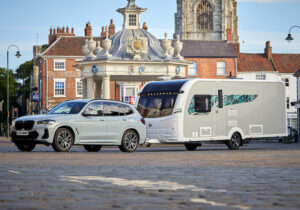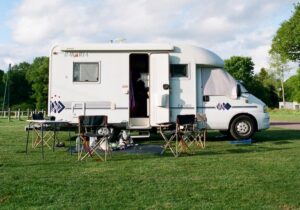Dan Cartwright has over 12 years of experience in the caravan and motorhome industry. He is a judge for a number of prestigious leisure vehicle awards and regularly heads off in his motorhome with his family. Every week, Dan shares his insights with the community. Here’s what he has to say this week.
This week in the Cartwright Chronicle, I’m pleased to introduce a very special guest – Rodrigo. He’s been a production manager here at CaravanTimes for several years and, like myself, has attended many industry events and seen the best of what our community has to offer.
Rod recently returned from the Sahara Challenge, where he was working as a producer and camera operator. A huge thanks goes out to him and the wider crew, who have provided fantastic updates and now published the full documentary, which you can check out below.
Inspired by the success of the Sahara Challenge and his first ever experience of staying overnight in a motorhome, Rod has decided to head off across the European continent for a two-week holiday with his partner.
Before we get into that, I want to share some of my touring plans based on hidden gems that I’ve uncovered.
The joys of pop-up campsites
Last year, we had the privilege of attending the Caravan and Motorhome Club (CAMC) pop-up campsite in Holkham Hall. Rod was actually with me then, too. We made a short video about the campsite which you can see below, but I wanted to highlight just how special these events are.
They offer the chance to camp in places you’d never usually be able to. At that event, we camped in the grounds of Holkham Hall, accompanied by sheep and deer, right in the heart of the estate.
Just a ten-minute walk took us to some of the best beaches in the UK and the site had everything we needed. CAMC pop-up camping provides electric hook ups, toilets, washrooms, showers and plenty of activities for the kids to do. It’s incredibly peaceful and beautiful, so it’s well worth checking out upcoming events. This is not rallying it really is a popup campsite.
The 2023 schedule has just been announced, with this summer’s pop-up campsite being held in the New Forest, which I’ll be visiting with my young family. It’s running between the fourth and 31st of July, meaning parents who want to enjoy the experience with their children can head straight there at the start of the school holidays in the final week of the month.
Prices start from just £39 per night. I’m really excited to wake up next to the famous wild horses, head to local villages and meet lots of friendly campers and CAMC staff.
Later in the summer, the Holkham Hall pop-up makes its return. From July 11th to September 17th, you’ll have the chance to experience one of my favourite ever campsites. I’d highly recommend taking a look at the CAMC website for more information.
A word of caution – these campsites fill up quickly. They’re space and time-limited, so if you are considering it, reserve a spot as soon as possible.
Now, on to Rodrigo!
Sahara Challenge Interview
I sat down with Rod to talk about the Sahara Challenge, what it was like to film and how it inspired him to plan his own adventure.
Tell us truthfully, how were the leisure vehicles?
Rod: “Incredible! The only damage was caused by drivers, not the vehicles themselves. We lost a jockey wheel due to rough terrain and a corner of a motorhome was bumped into on the ferry. Well, Martin Fitzpatrick took a slightly wide turn! A Ford Ranger also had a fuel leak after somebody went jumping over the sand dunes in it.”
Dan: “A few user errors, then. If you’re going to jump a two-ton pickup or crash into a post, you’re going to expect some damage, but it’s good to see the leisure vehicles held up.”
How easy was it to get to North Africa?
Rod: “It was surprisingly easy. The ferry crossing took a bit of time as the Moroccan authorities checked the vans with X-rays and there was lots of paperwork to do. After that, though, it was fine. The roads were great at the beginning but started to get much rougher as we headed south.”
What about the campsites and facilities?
Rod: “We stayed at what must have been a five-star campsite in Marakesh, with a swimming pool and restaurant. Then, we experienced others that were about the size of a parking space with really basic facilities. A mixed bag, for sure.”
What was the toughest thing about documenting the trip?
Rod: “Obviously, the Sahara Challenge team was very large. So, just the two of us documenting it was always going to be challenging. I’d say the biggest obstacle was that everyone was very tired from driving and the days just weren’t long enough – by the time we’d sit down to do interviews it’d be dark and impossible to film.
“Another challenge was that the two of us would always drive ahead. We’d scout for locations, head out first in the vehicle, get into position, let the convoy pass, then get back into our truck and catch up again. Overall the experience was really fun and we captured some amazing shots whilst hanging out the window with the camera!”
What was more fun, filming or editing?
Rod: “Filming. Easily.”
If you haven’t seen it, there’s a full documentary. It’s the result of six weeks of work for just two people. We’re really proud of it, so make sure to check it out.
Having worked on this for two weeks, what made you decide to plan a motorhome holiday this summer?
Rod: “I love being on the road. It’s even better if you have somewhere to sleep, no matter where you go. So, I thought it’d be a brilliant idea to try it for myself. The Sahara Challenge was amazing but ultimately, it was still work. Now, I want to go off on my own and take in the whole experience.”
Are you worried about taking it on a ferry?
Rod: “No, I won’t crash it into a pole – I promise!”
Where are you planning to go?
Rod: “My partner and I want to start in Switzerland. Obviously, that means we need to drive the motorhome there, but we might only stop once on the way. From there, we’ll follow the Alps through Italy, then head south through Slovenia, make our way to Croatia and then all the way back.”
Last one – how does your partner feel about this? Was she expecting a flight abroad, or is she ready for a motorhome holiday?
Rod: “She’s as excited as I am. My partner has never been in a caravan or motorhome before, so she’s looking forward to it. We’ve been on lots of journeys on my motorbike together with tents, but with the comfort of having a proper bed, kitchen and bathroom, it sounds great. Plus, a fridge full of beer… for when I finish driving, of course.”
Final thoughts
There we go! Whether or not you’re planning an exclusive minibreak in the UK, a trip to northern Africa, or even a cross-continental getaway, here are some ideas and inspiration for you to help.
If you are journeying abroad, check out the CAMC’s international site network. It’s great because you can plan your trip knowing exactly what to expect. Additionally, look at your insurance policies. I’d strongly recommend one with trip continuation. We always use the CAMC’s Red Pennant, but there are others available.





